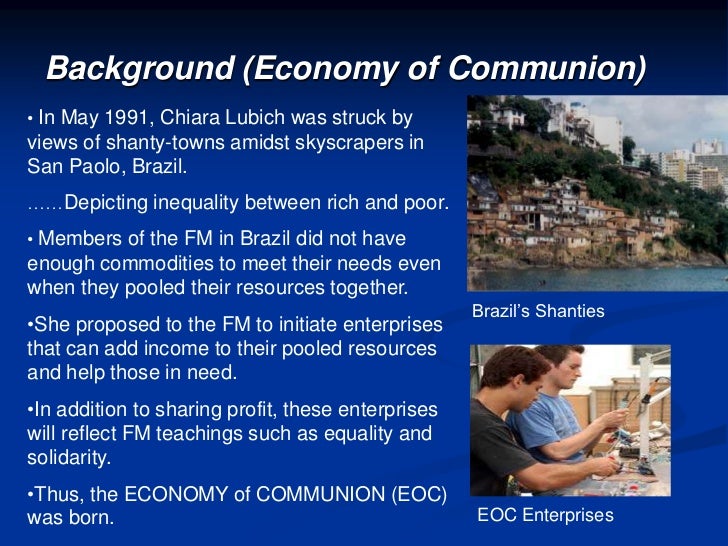We are all dreamers. Chiara Lubich, the founder of the Focolare Movement, had a dream where humanity would share like the first Christians. "All the believers continued together in close fellowship, sharing their belongings with one another" (Acts 2: 44). In WithBible magazine a principal of a Catholic Middle and High School writes about the EoC, Economy of Communion.
In 1991 in Brazil Chiara began the movement, an alternative to the present economic system: free competition which often doesn't distinguish between methods and means to achieve capital. Profit is the goal which generates more competition. In the process, we have the gap between the poor and the rich. This extends to areas of a country, between countries and between members of society.
Chiara Lubich took the ideas of St. Pope John Paul II in his encyclical Centesimus Annus and gave them life with the Economy of Communion. "The obligation to earn one's bread by the sweat of one's brow also presumes the right to do so. A society in which this right is systematically denied, in which economic policies do not allow workers to reach satisfactory levels of employment, cannot be justified from an ethical point of view, nor can that society attain social peace. Just as the person fully realizes himself in the free gift of self, so too ownership morally justifies itself in the creation, at the proper time and in the proper way, of opportunities for work and human growth for all" (#43).
Neoliberalism is the financial system by which most of the world has produced much wealth and benefited the lives of many but in the process a dehumanization of those who are not prepared for the cutthroat competition required.
With this kind of talk, many only see Communism as the alternative and consequently the opposition to social movements of this type. There are other alternatives and Economy of Communion is one of them. A very Christian alternative which the Church has promoted with its teaching.
811 such communities exist in the world today. Europe has the most with South America, Africa, North America and Asia in that order. We have a number of these places of work in Korea.
This year in Feb. they celebrated the 25th anniversary of the beginning of the EoC at the Vatican with 800 members from all over the world, 33 from Korea. The pope in addressing those present said three things that were listed in the article.
Money must not become an icon but must be shared with the poor. Secondly, those who become victims of capitalism are not only to be helped but the structural evil that continues to hurt them needs to be changed. With the profit, good can be done in helping society.
The Social Gospel of the Church becomes alive in movements like EoC and the problems that arise from neoliberalism are overcome. The Church in its work of evangelization is not only interested in the soul but also the body, consequently, concern for the financial and social areas of life. God made us in his image and this image needs to be protected.
